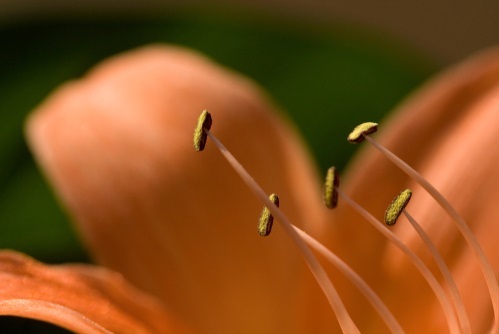
 Data Structure
Data Structure Networking
Networking RDBMS
RDBMS Operating System
Operating System Java
Java MS Excel
MS Excel iOS
iOS HTML
HTML CSS
CSS Android
Android Python
Python C Programming
C Programming C++
C++ C#
C# MongoDB
MongoDB MySQL
MySQL Javascript
Javascript PHP
PHP
- Selected Reading
- UPSC IAS Exams Notes
- Developer's Best Practices
- Questions and Answers
- Effective Resume Writing
- HR Interview Questions
- Computer Glossary
- Who is Who
What is Anther and Pollen Culture and what are the Advantages?
Introduction
Plant tissue culture is a valuable tool in plant biotechnology. It involves the manipulation of plant cells, tissues, and organs in vitro under sterile conditions. The technique has various applications in plant breeding, genetic engineering, and plant propagation. Two techniques commonly used in plant tissue culture are anther culture and pollen culture.
Anther culture involves the culture of immature anthers in a nutrient medium. An anther is a male reproductive organ found in flowering plants that produces pollen grains. Immature anthers contain microspores that can be induced to form haploid plants in vitro. The process involves the excision of immature anthers from a donor plant and their placement on a suitable culture medium. The anthers will eventually produce callus tissue, which can then differentiate into haploid plants.

Pollen culture, on the other hand, involves the culture of pollen grains in a nutrient medium. Pollen grains are the male gametes of flowering plants. They can be induced to form haploid plants in vitro. The process involves the collection of mature pollen grains from a donor plant and their placement on a suitable culture medium. The pollen grains will then germinate, and the resulting plantlets can be used for various purposes.
Advantages of Anther and Pollen Culture
Rapid Generation of New Plants
One of the primary advantages of anther and pollen culture is the rapid generation of new plants. The process allows to produce haploid plants, which are genetically uniform and can be used to develop new varieties of plants quickly. This can be especially useful in plant breeding, where new varieties are continually sought after.
Overcoming Barriers to Hybridization
Anther and pollen culture can be used to overcome barriers to hybridization. Hybridization is the process of crossing two different plant varieties to create a new variety. Sometimes, the two varieties are incompatible, and the resulting hybrids are sterile. Anther and pollen culture can be used to overcome this barrier by inducing the formation of haploid plants that can be crossed with other plants to produce fertile hybrids.
Production of Haploid Plants
Anther and pollen culture can be used to produce haploid plants, which are plants that contain only one set of chromosomes. Haploid plants are important in genetic studies because they allow for the study of the effects of individual genes without interference from other genes. They are also useful in plant breeding because they can be crossed with other plants to produce new varieties.
Genetic Modification
Anther and pollen culture can be used for genetic modification. The process involves the introduction of foreign genes into haploid plants, which can then be used to produce genetically modified plants. This can be useful in the production of plants with desired traits, such as disease resistance, increased yield, or improved nutritional value.
Clonal Propagation
Anther and pollen culture can be used for clonal propagation. The process involves the production of identical copies of a plant through tissue culture. This can be useful in the production of large quantities of plants with desirable traits.
Conclusion
Anther and pollen culture are valuable tools in plant tissue culture. They allow for the rapid generation of new plants, the production of haploid plants, the overcoming of barriers to hybridization, genetic modification, and clonal propagation. These techniques have various applications in plant breeding, genetic engineering, and plant propagation. With continued research and development, anther and pollen culture will continue to play an essential role in plant biotechnology.
FAQs
Q1. What is anther culture?
Ans. Anther culture is a plant tissue culture technique that involves the culture of immature anthers in a nutrient medium. The anthers will eventually produce callus tissue, which can then differentiate into haploid plants.
Q2. What is pollen culture?
Ans. Pollen culture is a plant tissue culture technique that involves the culture of mature pollen grains in a nutrient medium. The pollen grains will then germinate, and the resulting plantlets can be used for various purposes.
Q3. What are the advantages of anther and pollen culture?
Ans. The advantages of anther and pollen culture include the rapid generation of new plants, the production of haploid plants, overcoming barriers to hybridization, genetic modification, and clonal propagation.
Q4. What are haploid plants?
Ans. Haploid plants are plants that contain only one set of chromosomes. They are important in genetic studies because they allow for the study of the effects of individual genes without interference from other genes. They are also useful in plant breeding because they can be crossed with other plants to produce new varieties.
Q5. What is clonal propagation?
Ans. Clonal propagation is a process in which identical copies of a plant are produced through tissue culture. This can be useful in the production of large quantities of plants with desirable traits.
Q6. What is genetic modification?
Ans. Genetic modification is the process of introducing foreign genes into an organism to produce desired traits, such as disease resistance, increased yield, or improved nutritional value.

